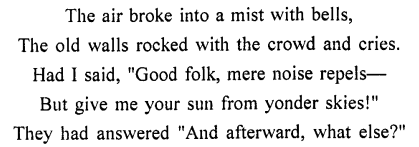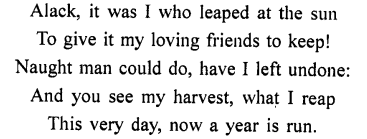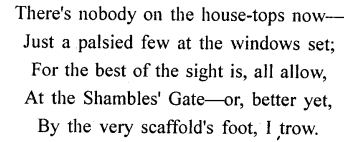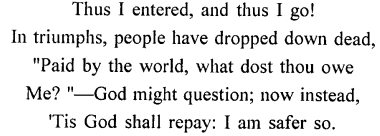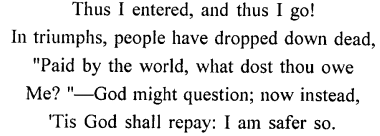Treasure Trove A Collection of ICSE Poems Workbook Answers Chapter 8 Notes – The Patriot – ICSE Class 10, 9 English
EnglishMathsPhysicsChemistryBiology
ICSE SolutionsSelina ICSE SolutionsML Aggarwal Solutions
About the poem
Robert Browning’s ‘The Patriot’ is a brilliant piece of dramatic verse. It deals with the fickleness of public opinion and hero-worship. The same people who lift you up to the skies will also pull you down into the ditch. Even, in the midst of tragedy, the poem ends quite optimistically. Death is not the end of everything. The patriot hopes that since he did not receive his reward in this world, he will be rewarded in the other world. He feels safe in the hands of God. Thus the poem also becomes an expression of Browning’s optimistic philosophy of life. “God is in His heaven and all is well with the world.” This poem is a criticism of politics and people’s opinion. When a leader comes into power, people call him a patriot. When he is dethroned, the same leader is considered a traitor. This is the tragedy of modern politics. The leader in this poem fell a victim to the same state of affairs. When he came into power, people showered flowers at him as a patriot. But after a year, they declared him a traitor, when he was no more in power. They took him to the gallows. But Browning has ended his poem not on a tragic, rather on a next world optimistic note. It is a poem, which exposes the political changes in the third world countries in which patriots are branded as traitor in coups.
Central Idea
The central idea of the poem revolves around the rise and fall of one’s fortunes. The world is a dynamic, fickle and transient place. Here the opinions of people change rapidly, without lending much thought to justice and truth. The patriot is first hero worshipped and celebrated, but within a year he is taken down for execution. Justice is not meted out to him and he believes that real justice can only be delivered by God. By this he also creates a contrast between the fickle nature of the public and the divine nature of God.
Word Meanings
- Myrtle – a sweet smelling flower.
- Like mad – in great enthusiasm.
- Heave – breathe.
- Sway – rise and fall.
- Church-spires – tall, pointed structures on the top of church buildings.
- A year ago – it happened only a year back.
- Broke into a mist with bells – church bells rung to welcome the patriot.
- Rocked – shook.
- Repels – hateful.
- Yonder – that.
- Alack – alas.
- Leaped at the sun – tried to do the impossible.
- Nought – nothing.
- Harvest – reward.
- A year is run – a year has passed.
- A palsied few – few diseased persons, afflicted with paralysis.
- All allow – everyone admits.
- Shambles’ Gate – the gate leading to the place of execution.
- Better – better view of the execution.
- Scaffold – a platform where the criminal is executed by cutting of his head or hanging him by a rope.
- Foot – near.
- More than needs – unnecessarily.
- A rope cuts – the rope is so tight that it cuts both his hands.
- By the feel – from the feeling.
- Misdeeds – evil actions.
- Thus I entered – i entered the city as a hero.
- Thus I go – lam leaving as a disgraced prisoner.
- Collapse – die.
- Triumphs – victories.
- What dost thou owe me – what do you owe to me.
- Requite – reward.
Paraphrase
People welcomed the patriot back with pomp and ceremony. His path is laden with roses and myrtle, which signify love, respect and honour being showered on the patriot by the people. The residents of the town have clambered onto their roofs to get a glimpse of the patriot and welcome him home and showcase their gratuity. The house itself moves and sways with the weight and number of people. Even the church spires were decorated with fiery coloured flags. The bright colour of the flags made the church spires look like they were on fire and flames were engulfing them.
The ringing of the church bells infected the air and it seemed to be echoing the celebratory noise. The walls of the city, which were already on the verge of erosion, due to time, reflected the impact of the din created by the crowd. It seemed to conduct the tremors and move. The patriot tells the people how he doesn’t want all the cheers and applause, but wants the people to fetch the sun from the skies for him. He wants the power, glory, admiration and honour. He wants to live in their memories as an immortal hero. The crowd replies to his request with a query as to after this, what else does he require. He doesn’t want extravagant celebrations that can die down with time. He is looking for something more permanent. The sun is a symbol of immortality, power, honour and glory. Hence, the patriot asks the people to fetch him their sun from the skies. The answer of the crowd is reflective of their frivolous nature. They immediately ask the patriot what else he would require, other than the sun.
The patriot says that despite him asking the townspeople to get him the sun, in the end it was he who leaped for it and got it for the people, who he refers to as his beloved friends. “Alack!” or Alas indicates a tone of regret. The patriot mourns about how his deed has been repaid by the people. His “harvest” is what he has reaped, whereas what he had sown was bringing glory, power and honour to the people.
Summary
Like with many of Browning’s poems, this is a dramatic monologue being that the character is talking to himself in a ‘dramatic’ way. The poem tells the story of somebody’s execution in front of the public: for which he is being misunderstood and should not be killed. It relates very much to the fall of leaders who, like the patriot, are misunderstood and killed because of this.
The very title, ‘The Patriot’ is thought-provoking. A patriot is someone who fights/ works for their country. They love their country and wifi do anything for their country too.
The first stanza is used to set the scene of the poem creating contrasting setting. It starts with, ‘It was roses, roses, all the way’ which are known for being beautiful and a theme of love. However, the stanza describes how the ‘house-roofs seemed to heave and sway’ which suggest the setting is cramped with houses. This is our first signs of the poem being based in a town where people are living in poverty. This was common in the Victorian times which introduces a time to this poem too.
There is reference to a old tale of Icarus on the first line, ‘it was I who leaped at the sun’. Icarus attempted to fly by sticking feathers to his arm with wax. However, the closer he flew to the sun, the more the wax melted until he fell from the sky. Browning uses this story to introduce an ideology to not be too ambitious which unfortunately the patriot was. Throughout the whole of stanza, the patriot is reflecting and thinking . He states, ‘Nought man could do, have I left undone’. He feels he did everything he could have possibly done. We gather he also has power, ‘what I reap’ illustrating how he has collected his rewards from the work he has done.
Stanza four looks more at the setting again at how nobody is out to watch the patriot’s execution except ‘just a palsied few’. ‘Palsied’ is the term given to the old and riddled with disease. This juxtaposes against what the patriot has achieved in his life. We know he has power which is clearly not reflected with the amount and type of people watching his hanging. The people that are outside are gathering at ‘Shambles’ Gate’ which is a place people would congregate to watch public hangings. The public execution (which another name for it is ‘scaffold’) is starting to make the patriot lose all dignity.
This stanza carries on from where stanza four left off to describe the public humiliation the patriot is undergoing. Pathetic fallacy is used ‘I go in the rain’. As well as making the patriot wet it also reduces his dignity. The rain can also be seen to symbolise how the patriot is innocent as he is washed clean. As well as this, rain in general represents corruption creating a negative tense mood. This describes the public who are clearly corrupt for hanging somebody who has doing nothing wrong. He undergoes pain for the first time with ‘a rope cuts both my wrists behind’ and ‘For they fling…Stones at me for my year’s misdeeds’. We can tell he is coming close to the end as tension has been built through the weather and the change in behaviour of those watching.
The last stanza can be summed up as the stanza where the patriot finally dies. He comes to the conclusion that some people die from doing good, ‘In triumphs, people have dropped down dead’. At the very end, he refers back to religion to create a universal meaning to the poem, ‘Tis God shall repay: I am safer so’. He feels safe (even though he is dying) because he knows morally he has done right and God will see this. From this, he feels fairly safe that he will go to heaven and not hell (like the public want him to go). This links into Browning’s message for the poem who asks whether it is better to be out of the world of corruption where it will be more peaceful than to be in the world. This leaves the reader in a tranquillity of conscience to decide upon this deep ideology
Imagery is used extensively.Browning decides to open on the image of “roses”, because it connotes the love that our speaker would receive from the public. The idea of them being “all the way” suggests the interminable nature of the public’s devotion for him,
which acts an antithesis of his execution later in the poem. “The house-tops seemed to heave and sway’The heaving and swaying motion creates an image of overcrowding, emblematic of our speaker’s importance. It suggests that he is a celebrated figure – one that everyone wants to see.
The tone is significant in conveying the mood of the public.“A year ago on this very day” is significant as it diverts our attention to the past tense, “a year ago”, foreshadowing that something has changed. It develops the self-pitying voice of our speaker, and its unexpected placing at the end of stanza one is symbolic of the abrupt end to the public’s devotion towards the speaker. This symbolically abrupt change in tone accentuates the theme of ‘the fickleness of the public’ that Browning ensures embodies the narrative.
“And afterward, what else?” adds to the image of endless love that the speaker received from the public. Browning includes the voice of the crowd here to indicate that the speaker is not exaggerating, and it makes his fall from glory even more tragic. It also adds to the reader’s frustration at Browning’s ambiguity throughout the poem, as his narrative gaps mean that we don’t know what caused the speaker to go from being so respected and celebrated to being executed.
The line “Alack, it was I who leaped at the sun” is a mythical reference to Icarus suggesting that the speaker was overambitious and took a step too far. It also helps develop the characterisation of our speaker, as it suggests that it w’as his hubris that led. to him crossing the boundaries and consequently losing popularity.
“There’s nobody on the house-tops now” juxtaposes with the earlier image of the house-tops that would “heave and sway” with people. Browning manipulates time, bringing us out of the speaker’s retrospective of the past and into the present tense.
Use of pathetic fallacy, “I go in the rain” helps to add to the depressed mood, and could be argued to be emblematic of the speaker’s inner-cries and sadness.
Browning establishes a semantic field of pain in “cuts”, “bleeds” and “stones”. This juxtaposes starkly with the semantic field of love that had been established in the opening of the poem: instead of roses being thrown at him, now there are stones. This serves the sole purpose of accentuating the change in his status, and acting as a structural antithesis of the beginning of the poem.
The alliteration in the line “In triumphs, people have dropped down dead” where the ‘d’ sound adds to the overarching image of brutality-the brutality he is unfairly experiencing now for “triumphs”.
The poem ends on a religious metaphor-’Tis God shall repay: I am safer so”. It suggests that the speaker has now accepted his fate, and knows that he only has to answer to God now – not the fickle public. He feels “safer” with God, rather than in society. The idea of him feeling “safer” suggests he has no sins, nothing to worry about, once again, ending the poem on a rather innocent depiction of the speaker.
The poem has a symmetrical structure, with actions and setting from the first three stanzas being mirrored in the last three. However, the actions and setting have much more negative connotations within the last three stanzas (it’s a complete antithesis), which Browning uses to emphasise the tragic fall of this’patriot.
Browning also labels the stanzas with Roman Numerals. This helps guide the readers through the different stages of The Patriot’s life, while also making Browning’s narrative gaps more noticeable, as we realise that there are stages of his life being omitted.
The rhyme scheme of the poem is consistent and follows a strict ababa pattern. It is also significant that the rhyme scheme is asymmetrical, which subtly foreshadows the fall of our patriot.
The narrative is told from the first person perspective of The Patriot himself. His voice is retrospective and self-pitying. The voices of the crowd that Browning embeds into the poem help to characterise our speaker as truly honoured and admired, so it seems too fickle for the public’s opinion to change without reason. As a result, this makes us doubt the reliability of our speaker, who characterises himself as nothing other than innocent.
For More Resources

